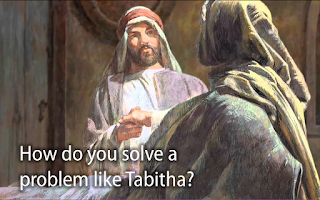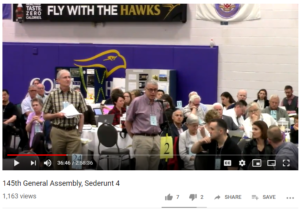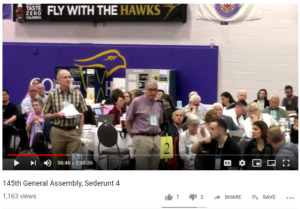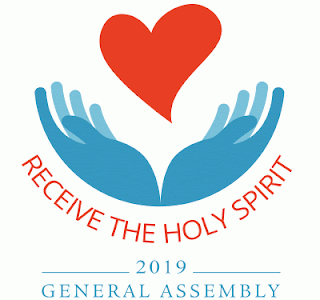Hespeler, 12 May, 2019 © Scott McAndless – Christian Family Sunday
Acts 9:36-43, Psalm 23, Revelation 7:9-17, John 10:22-30
here is a book that we know was extremely popular in the early Christian church. You might call it a second century best-seller though few know it today. It was read by Christians in churches spread throughout the Greek-speaking world but it was a book that did not ultimately make it into the Bible. It was called, “The Acts of Paul and Thecla.”
It told the story of a woman named Thecla who overhears the preaching of the Apostle Paul while sitting at a window. As a result, Thecla, who has been promised in marriage to a man by her family, decides that she doesn’t want to get married. Instead she leaves and becomes a devoted follower of Paul. This is seen as a terrible and rebellious act which results in the arrests of both Paul and Thecla. As the story progresses, Thecla is condemned to death a couple of times in creative ways. She is set on fire, thrown to the wild beasts and there are several attempted rapes. She survives it all and does things like put on men’s clothing, baptize herself and preach the gospel. It is actually a pretty exciting adventure all-in-all and I get why it was so popular.
Now, there is no way of knowing if Thecla was a real person and how much of her story really happened. I kind of suspect that the part when a female lion protected her from all the other beasts in the arena might be, let’s say, a bit exaggerated. But, no matter how much of her story really happened, I think that the simple fact that the book was undeniably popular in the early church actually tells us a lot.

The early Christian Church came into being in a society – ancient Mediterranean society – in which women were systematically shut out of any exercise of power. Women were worse than second-class citizens. But it wasn’t just that they were looked down upon, they were actually seen as dangerous. You can detect a distinct theme of fear of women throughout that ancient society. Women were so dangerous, it was commonly believed, that every woman needed to live her whole life under the authority of a man. She was to be under her father’s authority until such time as he was passed her on to her husband. If her husband died before her, then it was understood that her son would take charge of her. That was just how it was supposed to be and there were not supposed to be any exceptions.
When there were exceptions, like when Thecla refused to marry or when a widow without a son didn’t remarry, that was seen as a crisis – a problem to be managed. And so, for example, the story of Thecla being condemned to death for walking away from her arranged marriage would have been entirely believable in the first century.
Now, when the Christian Church first started out, I’m pretty sure that it was just assumed that the church would go along with the restrictions on women that were part of that society. There are no indications in the opening chapters of the Book of Acts that the church had any place for independent females. And, after all, what did the church have to go on in those early years? All they had were the teachings of Jesus that had been passed onto them and the scriptures. And when I say the scriptures, what I mean are the books of what we call the Old Testament. The New Testament would take quite a while to establish.
The scriptures certainly wouldn’t have given the church much reason to give leadership roles to women; there are very few examples of that in the Old Testament. And as for the example of Jesus, well it seems that he did have some independent women in his discipleship group. That was certainly scandalous in his time. But, in the early church, they seem to have tried to back off from that example. It was just safer that way.
But then, the Book of Acts tells us, something happened. The leaders of the early church ran into people like Tabitha. You see, there is something strange going on in our reading from the Book of Acts this morning. Simon Peter and the other male leaders of the church are busy doing male leadership stuff like organizing the churches. “Now as Peter went here and there among all the believers, he came down also to the saints living in Lydda,” is how the passage before the one we read this morning starts. But while he is doing his supervising, he gets an urgent message from Joppa. Something strange is going on there. There is a group of women there – and it seems to be a large and well-organized group. They are collectively called the widows.
And I know that we would hear that and say, what’s the big deal, so there are a bunch of widows in Joppa. But it is actually a very big deal that ancient readers would have noticed because they would have found the very idea of a large group of women who are not under the control of any men to be a very scary thing! This was something that was not generally tolerated in that society. Most women who lost their husbands would have been pushed to marry again as soon as possible. But here, in Joppa, these women have remained not only independent but also very active. Their leader in this is this woman named Tabitha and under her leadership, they are devoted to good works and charity and, in particular, they make clothes together for people who need them.
This reflects a reality that we know existed in the early church. There were, in many churches, large groups of widows who banded together and did these kinds of good works. There is an extended passage in the First Letter of Timothy that deals with regulating the activities of such groups in churches. But the very existence of such groups doesn’t really seem to have been anticipated in the organization of the church as it started out. Nobody gave the women of the church that kind of power and independence. They just took it and did something amazing with it.
It reminds me of something that happened in our own Presbyterian Church over its long history. You see, there was a time many years ago when women where barred from holding any leadership positions in our churches. Women could not be ministers and they could not be elders. Those restrictions were based, I would say, partially on misreadings and misinterpretations of the Bible but probably even more on certain patriarchal attitudes that were an essential part of western society at that time.
But, wherever they came from, those restrictions were there. And so, let me ask you, what did Presbyterian women in our churches do about those restrictions? Did they just sit back and keep quiet and let the men take care of everything? No! I’ll tell you what the women did. When they were apparently not taken into account within the power structures of the church, they simply went ahead and set up their own power structures. In particular, women created what they called societies – Women’s Missionary Societies.
Now, that doesn’t sound particularly powerful or threatening does it – a society? But these WMS groups became very powerful. I mean it was good and positive power, but it was power. They raised huge amounts of money. They supported the work of the local and the national church in some very significant ways. And, as their primary mandate, they spearheaded and enabled national and international mission in ways that shaped the destiny of both Canada and the world. Make no mistake, these societies had a huge impact and yet they were created by people who officially held no positions of power in the church.
Isn’t that interesting? None of the male leadership of the church had planned it or left space for it, but a huge and very significant movement entirely led by women grew up to have an amazingly positive impact on the life of the church. I believe that basically the same thing happened in the early Christian Church. In many places, totally unanticipated, these powerful organizations of independent women just grew into being.
That, in my mind, is what makes our story from the Book of Acts so interesting this morning. We need to understand that, in this passage, Peter is not simply responding to a pastoral concern – a much-loved member who is sickened and died. I mean, he is doing that, but he is also dealing with a problem named Tabitha. He is dealing with a new unauthorized power base that has arisen in a church.
When he arrives in Joppa, the group of widows that is there swarm around him. They weep, expressing their grief, but they also make a point of showing Peter the evidence of the positive impact that Tabitha’s leadership has had by showing him the clothes that she had made for the poor of the city. They are making the case, not only that Tabitha is a good person who needs to be raised from the dead, they are making their case that their independent society of widows should be allowed to continue without interference.
And make no mistake, Peter is facing a dilemma here. If he does what they ask, he is not just compassionately responding to the needs of one person, he is effectively giving the nod of approval to an unauthorized power base for independent women within the church.
Peter, to his credit, does not hesitate. He hears the story and he immediately springs into action. He puts everyone out of the room, prays and gives her an order: “Tabitha, get up!” This is not just a miraculous resurrection, this is like what we would call an ordination. Peter takes her from there and presents her, not only to the widows who see her as their leader but also to the saints, which is to say to the whole church, recognizing her leadership among them all.
This is the story of the early church and yet it is also the story of the continuing church. We all set out with our ideas about how things are supposed to work and what leadership will look like, ideas that are often conditioned by the culture in which we live. For example, these days we often have a tendency to structure our churches the same way that you might structure a company or business, because that is the dominant organizational idea we find in the world around us. There is nothing biblical about that; we just assume that that’s how things are supposed to work.
But the early church clearly discovered that the Holy Spirit had a way of confounding their expectations. One of the ways the Holy Spirit did that was by raising up leadership from unexpected or even prohibited places. When that happened, the church had a choice. It could have responded with the natural human response and resisted the change and the violation of cultural expectations. Sometimes the church did that and we see reflections of it even in the scriptures, like, for example in that passage from 1st Timothy I spoke about where the writer seeks to restrict the liberty and power of the widows.
But when the church was wise, it recognized the work of the Holy Spirit and was willing to embrace the new thing that God was doing among them. I believe that is what we are seeing Peter do in our reading this morning.
But I do not think that this is a process that ended when the Book of Acts was completed. I think that the Holy Spirit continues to delight in confounding our expectations about how things ought to work in the church to this very day. We are living in times of great change – times when the old ways of operating the church just don’t work so well anymore. For example, we are certainly finding in our churches that groups like the Women’s Missionary Society do not function like they once did. One of the reasons for that is a really good reason. We no longer restrict women from important roles in the church, which is a great blessing to the church, so the need for independent women’s societies is lessened. There are also demographic changes and changes in the expectations that our society places on women that also put such societies under pressure.
We are very blessed to have active WMS groups in this congregation, but I know that many others no longer have them. It is hard to see that kind of change and I know it sometimes makes people despair for the future, but I am not really worried about that.
The Holy Spirit is still active and at work in the church. The Holy Spirit is still sending us Tabithas, people sent to lead us in new and exciting directions. My only worry is that, because the new leaders and new ideas, the best of them, often come from unexpected and even forbidden places, like what happened with Tabitha, we might fail to recognize that leadership, fail to hear what the Holy Spirit is saying and so miss out on the most exciting parts of the journey that is ahead. I pray that we do not let that happen and that, like Peter, we embrace the unexpected when God places it before us.






